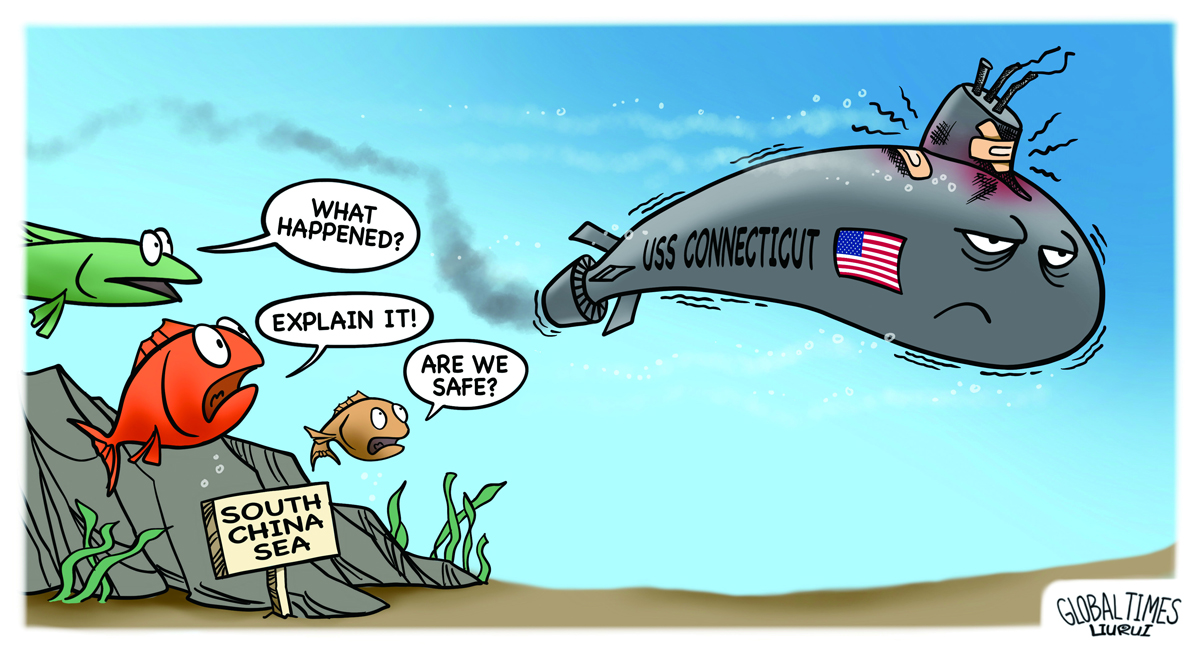US submarine collision raises red flag on maritime security

Graphic/Global Times
US nuclear submarines are really making a splash these days. First, they elbowed aside their French counterparts in an extravagant submarine deal that America had secretly signed with Australia, a “stab in the back” so hurtful that it prompted France to recall its ambassadors. Then, on October 2, a US nuclear submarine collided with an “unknown object” in the South China Sea, an area the US never gets bored of barging and roiling around in.
It took nearly a week for US officials to disclose little to no information on the incident. Two unnamed US defense officials revealed last week that 11 sailors had been injured despite the submarine remaining “fully operational,” but they stopped short of offering any hint at what might have caused the collision.
Unlike the deal-stealing farce that has soured bilateral relations, the submarine collision is of particular international concern, requiring a full and sound investigation and explanation. That’s because the incidence took place in the waters of busy shipping lanes and waters that house a treasure trove of fishery resources and other commercial prospects. More importantly, a nuclear-powered submarine, unlike a fishing boat or other naval vessel, once involved in an accident, could possibly turn into a ‘slow-motion Chernobyl ’ that has the potential to cause unimaginable environmental hazards for centuries to come.
Zhou Chenming, a researcher with the Yuan Wang think tank, voiced his concern over the incidence. Drawing a parallel between the recent US submarine collision and the one that occurred 21 years ago involving the Russian nuclear-powered cruise missile submarine K-141 Kursk, which killed all 118 personnel on board, Zhou warned that the American nuclear submarines, with their single-hull structure (differing from the Russian sub with twin hulls), “might cause some nuclear waste to leak out when struck severely.”
China, among other nations, has called for the US to clear up the facts on the US nuclear submarine accident. At a regular press conference held on October 11, Chinese Foreign Ministry Spokesperson Zhao Lijian criticized American officials’ vague statement and irresponsible attitude, as well as their stonewalling and cover-up attempts, as he demanded answers from the US side.
“It is incumbent on the US to clarify the details of the accident and explain the following questions,” the spokesperson said, going further to ask that, “First, where exactly did the accident take place? Second, did the accident cause nuclear leakage and pollute the marine environment? Third, will this accident impact the navigation safety and fishery in the area where it took place?”
“The US side should take a responsible attitude, give a detailed account of what happened as soon as possible and make a satisfactory explanation to the international community and regional countries,” he added.
Apart from the possible environmental hazards that such a collision can result in, some experts also worry that the unruly movements of US nuclear submarines can disturb fisheries and torpedo offshore fishing infrastructures. At present, many countries have their “fishery presence” in the South China Sea, for example, the Norwegian fish farming company SalMar ASA, one of the world's largest companies engaged in salmon production and processing, has built the world’s first automated offshore fish farm. If the expensive infrastructure for those fisheries gets struck by a rampaging submarine, or worse still, if the radioactive materials that power such submarines leak into the sea, the economic and environmental tolls would be beyond calculable, some have worried.
Sometimes, you have to hope beyond hope that the US would act responsibly on issues of global concern, such as issues pertaining to maritime security. Remember that when Japan, against the fierce opposition of China, South Korea, and even its own domestic fishermen, revealed its determination to discharge nuclear wastewater generated from the Fukushima Daiichi nuclear disaster, the US quickly moved to express its support for its ally’s reckless decision, regardless of whether radioactive-polluted fish might end up on everyone’s dinner tables.
But as the only superpower, which boasts the world’s most extensive and advanced nuclear arsenals, the US should beware that the global village is not a lawless place without a traffic light to be seen, with its irresponsible and reckless voyages in international waters having the chance to harm itself as well as other nations. To prevent future tragedies, the US must detail the causes of the incidence, and the damages that have resulted. Any stonewalling or cover-up is unacceptable.
Photos
Related Stories
- China urges U.S. to clarify nuclear submarine incident
- Indonesian Army detects underwater movement at last location of missing submarine
- Indonesian submarine with over 50 aboard feared sunken: local media
- Aussie-made autonomous submarine draws immersive 3D underwater maps
- China’s first AIP submarine unit breaks records
Copyright © 2021 People's Daily Online. All Rights Reserved.










